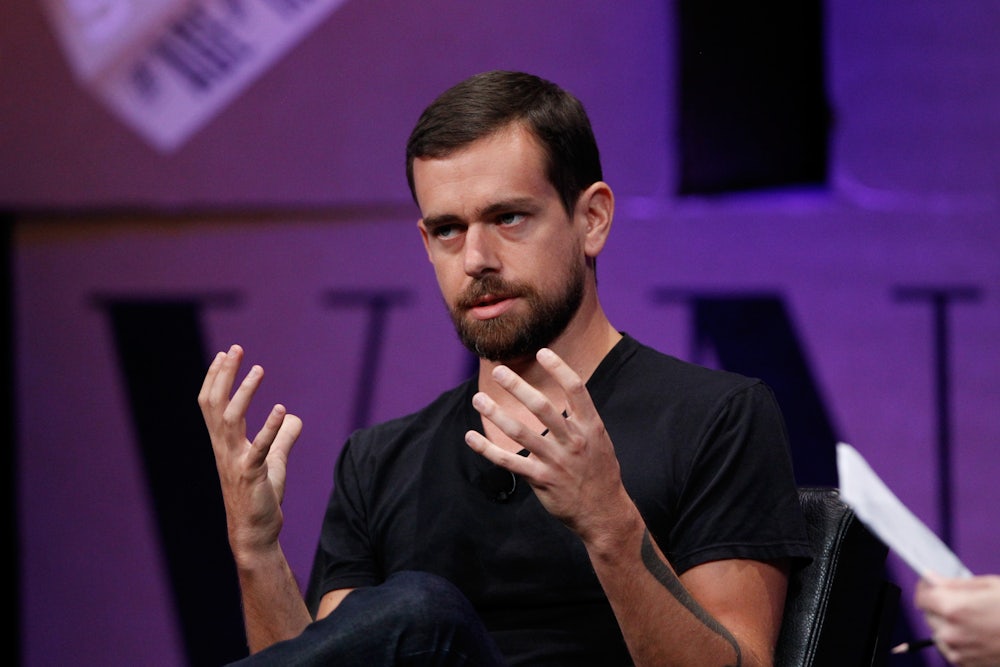Tech companies are fending off criticism from all political corners. Democrats have called for greater regulation, comparing Facebook and Google to the railroad trusts of the 19th century and asking tough questions about the ease with which platforms were overtaken by hostile actors during the 2016 election. On the right, Fox News’s Tucker Carlson and other conservatives have argued that social media companies are infected with liberal bias and that Silicon Valley discriminates against conservatives. When Facebook founder Mark Zuckerberg was hauled before Congress earlier this year, he was grilled by Ted Cruz about Diamond & Silk, two conservative vloggers who claim that the tech giant censors them.
Tech companies have made particular efforts to avoid alienating conservatives in recent months. In April, Facebook announced that it would participate in an audit led by the Heritage Foundation—not exactly a neutral arbiter—that would examine accusations of bias. And on Wednesday, The Washington Post reported that executives from both Facebook and Twitter were “scrambling to assuage conservative leaders who have sounded alarms—and sought to rile voters—with accusations that the country’s tech giants are censoring right-leaning posts, tweets, and news.”
Tech companies are motivated by several factors. There’s a business reason, of course. As Michael Jordan once (allegedly) said, “Republicans buy sneakers, too.” Tech companies want to keep their customers happy and avoid boycotts and bad press. But there’s a political reason as well. With Democrats increasingly in favor of greater regulation, tech companies will need Republican allies to head off legislation that hurts their bottom line.
What these Silicon Valley companies apparently fail to realize is that they might be getting played. Republicans are tacitly threatening regulations, but are less interested in regulation for its own sake than getting concessions from some of the biggest media platforms in the country.
As part of his campaign to assuage conservatives, Jack Dorsey, the Twitter co-founder and CEO, has met with conservative leaders, politicians, and commentators, including Grover Norquist, Sean Hannity, Ted Cruz, Greta Van Susteren, and Trump communications adviser Mercedes Schlapp. And what did these leaders complain about? From the Post’s report:
Complicating matters is that executives in the uppermost ranks of Facebook, Google and Twitter are some of the most outspoken corporate foes of Trump. That’s led to suspicions among conservatives that tech companies’ efforts to clean up their platforms, by banning hate speech and vetting some content for misinformation, are actually targeting them. ...
The Twitter executive heard an earful from conservatives gathered at the table, who scoffed at the fact that Dorsey runs a platform that’s supposed to be neutral even though he’s tweeted about issues like immigration, gay rights and national politics. They also told Dorsey that the tech industry’s efforts to improve diversity — after years of criticism for maintaining a largely white, male workforce — should focus on hiring engineers with more diverse political viewpoints as well, according to those who dined with him in D.C
These are cultural concerns—and alarming ones at that. Tech companies have been criticized for allowing their platforms to be used by violent racists and misogynists, and for failing to foster diverse and inclusive workplaces. Conservatives are essentially using these concerns about as cover for a different agenda, arguing that attempting to ban hate speech is backdoor censorship and that efforts to create a more diverse workplace are leading to discrimination against conservatives.
These concerns pale when placed next to the monopolistic power of tech platforms like Facebook and Google and the way Russia used social media to influence the 2016 election. A dark irony is also at work here: as New York’s Max Read notes, “the conservative movement has found itself with complete control of the federal government and in power in a majority of states across the country—and it’s taken that power thanks in a large part to social media like Twitter and Facebook.”
Regulatory concerns have been bandied about on the right. Tucker Carlson has called on Google to be regulated as a utility, as has the National Review, albeit for cultural rather than economic reasons. In April, Republican Senator Joe Kennedy told Face the Nation, “My biggest worry with all this is that the privacy issue and what I call the propagandist issue are both too big for Facebook to fix, and that’s the frightening part,” hinting he would be interested in taking action. (However, he also indicated that he didn’t want them to be “regulated to death.”)
But these criticisms, as the Post’s reporting shows, are outliers. For the moment, Republicans aren’t all that interested in regulating big tech—they’re interested in using the threat of unspecified regulation to scare these companies into amplifying the conservative movement’s message. It’s a con, in other words. And Jack Dorsey and Mark Zuckerberg are the marks.
